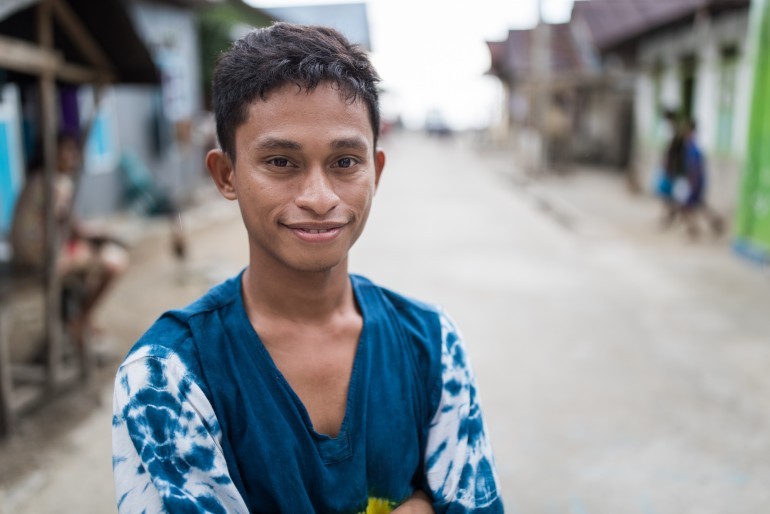Practice makes perfect! Aqul Marasabessy has proven that by attending three separate Bahasa Basudara courses, over a short period, not only his proficiency in the English language, but also his confidence had improved tremendously. So much so that when he sat the IELTS test (International English Language Testing System) for the second time last August, he finally got the much-coveted IELTS score of 7.0. in September. He has now applied to three different universities in the USA (Miami University is his first choice) to study Marine Ecosystems and Society.
Aqul had graduated in 2018 with a Marine Science degree from the University of Pattimura in Ambon and knew that he wanted to continue studying abroad. But like any other person from Indonesia, he had to pass the compulsory IELTS test first, to study (or apply for a job) overseas. His first score in 2017 was a mere 6.0 and unfortunately not enough to qualify to study abroad. Even though he already got a scholarship from the LPDP (Lembaga Pengelola Dana Pendidikan), a government-sponsored scholarship fund that enables young Indonesians with potential to receive a post-graduate education at various universities around the globe.
He has written this story of the place where he used to attend the Bahasa Basudara classes and why he would like to give something back to this community.
"Every fortnight I make the journey from Ambon to my
village in Pelauw, Haruku Island to look after my grandfather’s overgrown clove
plantations. Almost all his children work as civil servants or have left the
island, so the plantations have been left abandoned. It is a situation that has
happened to most of the villagers as they believe that the grass is greener in
a big city like Ambon. I started an initiative to collectively manage the
plantation of the family to strengthen family relationships and protect my
grandfather’s heritage.
Like a lot of young people, my life revolves around my mobile phone and I have become highly dependable on a good internet connection. Although I love my village, I have turned into this cosmopolitan who finds it hard to live without a good connection. 2 G is just not enough. Every Thursday evening, I have 2 Bahasa Basudara classes and every time it is a struggle to find a suitable spot with a stable internet connection for the Zoom call. I am extremely fortunate that my childhood friend who lives in Ory, the neighbouring village, had built a bamboo shelter especially for learning and online class purposes. This area has a better internet connection than in my own village.
The shelter on stilts, sits above the water and is called Walang Anak Pesisir. It was built with locally sourced bamboo from a nearby forest. The 6x6 m2 construction is built from bamboo (roof, poles, and floor) and is located inside a small bay in North Haruku. It is sheltered from harsh sea conditions and you when you look down you into the crystal-clear water you can see the seagrass and small fish swimming around. Sometimes at sunset, the sky and the sea turn red and with the gigantic green mountain of nearby Seram Island. The scenery could not have been more perfect.
“It took 3 months for us to finish it,” said Ongker the head of the Anak Pesisir Community, when I asked him about it. He funded the shelter himself and created the community in early 2020. Besides providing learning space for the younger generation, who during to COVID-19 restrictions were learning from home, he also wanted to raise their environmental awareness by focusing on marine ecosystem issues and in particular the importance of mangroves. As a Marine Science graduate, this was right up my street - we clicked immediately. What followed were some insightful conversations relating to this issue and we concluded that we had to collaborate with organisations who were already dealing with the mangrove issue.
Unlike me, Ongker did not attend university, he is auto-didact and learnt everything through online sources, where he learnt about mangroves. He then put his knowledge into practice and since February this year, has planted 480 mangroves, of which 60 grew successfully. He learnt things through trial and error, which I found very admirable.
I hope that I can get my place at Miami University, as I would return to my island again after my study and put what I have learnt into practice, to help the community I grew up in."


11_105_90.jpg)




_105_90.png)